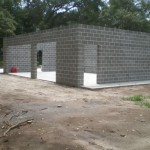How Much Does It Cost To Build A Garage From Scratch?
Constructing a garage from the ground up represents a significant investment, both in terms of capital and time. The final cost can fluctuate considerably based on a multitude of factors, encompassing the garage's size, design complexity, materials utilized, regional labor rates, and required permits. Understanding these influencing variables is crucial for establishing a realistic budget and managing expectations throughout the construction process. This article will explore the various cost components involved in building a garage from scratch, providing a comprehensive overview to aid in informed decision-making.
Before delving into specific cost breakdowns, it’s important to consider the different types of garages that can be built. The simplest and often most affordable option is a detached garage, a standalone structure separate from the main house. Attached garages, sharing at least one wall with the house, often require more intricate construction and can increase the overall cost due to modifications to existing structures and shared utility lines. Furthermore, the number of bays (i.e., the number of vehicles the garage can accommodate) directly impacts the overall footprint and, consequently, the price. Garages can range from a single-car capacity to multiple bays, each adding to the material requirements and labor involved.
Beyond these basic configurations, customization can further influence the expenses. Features such as additional windows, specialized doors (e.g., insulated doors, roll-up doors), enhanced electrical wiring (e.g., for power tools or electric vehicle charging), and specialized flooring options all contribute to the total cost. A clear understanding of desired features is paramount for accurately estimating the project's financial scope and avoiding unforeseen expenses down the line.
Key Point 1: Material Costs and Their Impact
One of the most significant contributors to the overall cost of building a garage is the price of materials. The choice of materials will influence not only the aesthetics of the structure but also its durability, maintenance requirements, and long-term value. The foundation, framing, roofing, siding, doors, and windows each represent a distinct material-related expense.
Concrete, used for the foundation and often the floor, is typically priced per cubic yard. The cost of concrete can vary depending on the region, the supplier, and the presence of reinforcing elements like rebar. The thickness of the concrete slab, which is determined by the intended use of the garage (e.g., storing heavy equipment), directly impacts the required quantity and therefore the cost. Poor-quality concrete or inadequate reinforcement can lead to cracking and costly repairs down the line.
Framing, which forms the structural skeleton of the garage, is commonly constructed from either wood or steel. Wood framing, typically using lumber like pressure-treated pine or fir, is often a more budget-friendly option, particularly for smaller garages. However, steel framing offers superior strength, fire resistance, and resistance to pests. The downside of steel is often higher material and labor costs, as specialized skills and equipment are needed for proper installation. The choice between wood and steel depends on the desired level of durability, local building codes, and budgetary constraints.
Roofing materials also play a vital role in the overall cost. Asphalt shingles are a common and relatively inexpensive option, offering decent protection from the elements. However, other options, such as metal roofing, tile, or wood shakes, offer enhanced durability, aesthetic appeal, and longevity. These premium options typically command a higher price point. The complexity of the roof design, including the pitch and the presence of features like dormers, will also affect the labor costs associated with roofing installation.
Siding, which protects the garage from the elements and contributes to its visual appeal, is available in a variety of materials, each with its own pros and cons. Vinyl siding is a popular choice due to its low maintenance requirements and affordability. Wood siding, while aesthetically pleasing, requires regular painting or staining to prevent rot and insect damage. Brick or stone siding offers superior durability and aesthetic appeal but comes at a significantly higher cost. The choice of siding material should consider local climatic conditions, the desired level of maintenance, and the overall aesthetic of the property.
The garage doors themselves represent another significant expense. Basic manual doors are the most affordable option, but automated doors with electric openers offer convenience and security. Insulated doors are recommended for climates with extreme temperatures, as they help to regulate the garage's internal temperature and reduce energy consumption. The size and style of the door, as well as any additional features like windows or decorative hardware, can also impact the overall cost.
Windows, while optional, can greatly enhance the natural light and ventilation within the garage. The type of window (e.g., single-pane, double-pane, casement, sliding) and its size will influence the cost. Energy-efficient windows, while more expensive upfront, can help to reduce energy bills over the long term.
Key Point 2: Labor Costs and Permitting
Labor costs constitute a substantial portion of the overall expense of building a garage from scratch. These costs encompass the wages paid to contractors, subcontractors (e.g., electricians, plumbers), and laborers involved in the project. Labor rates vary significantly depending on the region, the experience and reputation of the contractors, and the complexity of the work involved.
Before construction can commence, it’s imperative to obtain the necessary permits from the local building authorities. These permits ensure that the construction adheres to local building codes and safety regulations. The cost of permits varies depending on the municipality and the size and complexity of the project. Failing to obtain the required permits can result in fines, delays, and even the forced removal of the structure.
The foundation work, including excavation, pouring the concrete slab, and ensuring proper drainage, requires skilled labor and specialized equipment. The cost of foundation work can be influenced by factors such as the soil conditions and the presence of underground utilities.
Framing the garage, whether using wood or steel, demands precision and expertise to ensure structural integrity. Hiring experienced framers is crucial to avoid costly errors and ensure that the garage is built to code. The complexity of the framing design, including the number of load-bearing walls and the roof pitch, will influence the labor costs.
Electrical work, including wiring, installing outlets and lighting fixtures, and connecting the garage to the main electrical panel, must be performed by a licensed electrician. Improper electrical wiring can pose a serious fire hazard. The cost of electrical work depends on the number of circuits required and the complexity of the wiring layout.
Plumbing work, which may be required if the garage includes features like a sink or a toilet, must also be performed by a licensed plumber. The cost of plumbing work depends on the complexity of the plumbing layout and the distance from the existing water and sewer lines.
Installing the roofing, siding, doors, and windows requires specialized skills and equipment. Hiring experienced contractors for these tasks ensures that the materials are installed correctly and that the garage is properly sealed against the elements. The cost of these tasks depends on the type of materials used and the complexity of the installation.
Key Point 3: Site Preparation and Additional Costs
Before construction can begin, the building site must be properly prepared. This may involve clearing vegetation, leveling the ground, and removing any obstacles that could impede the construction process. Site preparation costs can vary depending on the condition of the land and the extent of the work required.
If the site is located in an area with poor soil conditions, soil stabilization may be necessary to ensure the stability of the foundation. Soil stabilization techniques can include compacting the soil, adding gravel or other materials, or using chemical stabilizers. The cost of soil stabilization depends on the extent of the problem and the chosen stabilization method.
Connecting the garage to existing utilities, such as water, sewer, and electricity, can incur additional costs. Trenching may be required to run utility lines from the main house to the garage. The cost of utility connections depends on the distance and complexity of the connections.
Landscaping, which can enhance the aesthetic appeal of the garage and integrate it seamlessly with the surrounding property, represents an additional cost. Landscaping may include planting trees and shrubs, laying sod, and installing walkways or driveways. The cost of landscaping depends on the extent of the work and the chosen landscaping materials.
Interior finishing, such as drywalling, painting, and installing flooring, can further increase the overall cost. The level of interior finishing depends on the intended use of the garage. For example, a workshop may require more durable flooring and ample lighting, while a storage space may only require minimal finishing.
Unexpected problems, such as unforeseen soil conditions, hidden underground utilities, or changes to the original design, can also add to the cost. It’s prudent to set aside a contingency fund to cover these unforeseen expenses.
In conclusion, determining the cost to build a garage from scratch requires careful consideration of various factors, including material costs, labor rates, permitting fees, site preparation, and potential unforeseen expenses. A detailed budget, incorporating all these elements, is essential for managing the project effectively and avoiding financial surprises. Obtaining multiple quotes from qualified contractors and researching material prices are crucial steps in accurately estimating the total cost of the project.

Average Cost To Build A Garage Forbes Home

How Much Does It Cost To Build A Garage 2024 Data Angi

How Much Does It Cost To Build A Garage In 2024 Trusscore

Cost To Build A Detached Garage 2 Car Fixr

Garage Build Cost Guide 2024 How Much To A

Cost To Build A Detached Garage 2 Car Fixr

How Much Does It Cost To Build Detached Garage Estimate Florida Consulting

Is It Er To Build Or Buy A Garage Doityourself Com

How Much Does It Cost To Build A Garage From Scratch

How Much Does It Cost To Build A Garage
Related Posts








